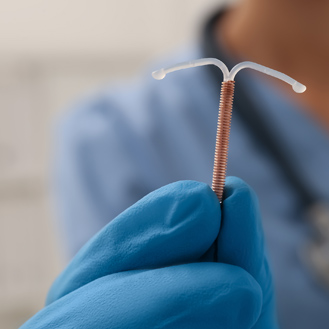
November 20, 2023
By Erica Crawford, Drexel University College of Medicine
Emergency contraception (EC) is used to prevent pregnancy before it happens after unprotected sex or at times when birth control fails during sex. It is different from the abortion pill, which is meant to terminate pregnancies after they have already occurred. There are a variety of reasons someone might need EC. Perhaps they forgot to take their birth control pill that day or place their vaginal ring. Maybe the condom broke during sex or their partner did not pull out in time. Or, devastatingly, someone might need it after a sexual assault. Whatever the reason, there are fortunately many EC options out there that can and should be used as soon as an unprotected sexual encounter occurs.
IUDs
Copper IUD
The copper IUD (Paraguard) is touted as the most effective form of EC and can lower the risk of pregnancy by 99.9%. It be inserted within five days after unprotected sex. It can then be left in as a primary form of birth control for up to ten years and can be removed at any time when pregnancy is desired. Some side effects include worsening menstrual bleeding and cramping, so it may not be suitable for people who already have painful periods.
Mirena and Liletta IUDs
Newer research suggests hormonal IUDs containing at least 52mg levonorgestrel (Mirena and Liletta) can also be used for EC. Like the copper IUD, they are most effective when inserted within five days after unprotected sex. They can be left in for long-term contraception for up to eight years and can also be removed at any time when pregnancy is desired. Unlike the copper IUD, hormonal IUDs can decrease menstrual bleeding over time.
Unlike the oral medications that will be further discussed, the efficacy of IUDs is not affected by body weight. The oral medications have been shown to be less effective in those with BMI >25.
Oral Medications
Levonorgestrel-only based pills (Plan B One-Step)
Levonorgestrel is a synthetic form of progesterone that works to delay ovulation. It is most effective when taken within three days of unprotected sex, with decreasing effectiveness if taken within five days. There are many over-the-counter options of this medication available, most commonly known as Plan B One-Step, with no age restriction.
Ulipristal (ella)
Ulipristal inhibits progesterone from binding to its receptor, which causes a delay in ovulation. It can be taken within five days of unprotected sex and, unlike Plan-B, its efficacy does not decrease over time within those five days. However, it is only available by prescription and can affect your regular progestin-containing birth control method for five days following administration.
Yuzpe Method – using home OCPs
Oral contraceptive pills (OCPs) containing both estrogen and progestin can also be used as EC. If you already have prescription OCPs available, you should talk with your doctor to discuss the best dosage to take as EC, since different OCPs contain varying amounts of hormones. They will need to be taken within five days of an unprotected sexual encounter and then a second dose needs to be taken in 12 hours. This can be beneficial for those with limited access to the other options noted above. However, this method has been seen to have increased side effect risk of nausea and vomiting compared to the previously mentioned oral options.
Sources/Resources: